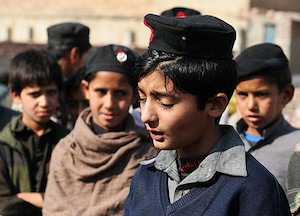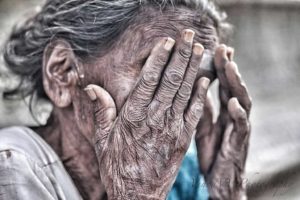American Drones Make Education in Pakistan Impossible
Young minds in northwestern Pakistan are among the less obvious casualties of drone strikes led by the United States in that region. A pervasive fear of death and injury and the need to take care of injured relatives and orphaned children stand between untold numbers of Pakistani youths and their education.
Young minds in northwestern Pakistan are among the less obvious casualties of drone strikes led by the United States in that region. A pervasive fear of death and injury and the need to take care of injured relatives and orphaned children stand between untold numbers of Pakistani youths and their education.
“Our minds have been diverted from studying,” said Faheem Qureshi, the sole survivor of the first drone strike in North Waziristan carried out by President Obama. His comment comes in an interview cited in “Living Under Drones,” a report on the impact of the drone war on Pakistanis published this month by researchers and human rights lawyers at Stanford and New York University.
Qureshi was one of the top four students in his class before an attack fractured his skull and nearly blinded him. Now he struggles to think, pay attention and maintain emotional stability. “We cannot learn things because we are always in fear of the drones hovering over us, and it really scares the small kids who go to school. … At the time the drone struck, I had to take exams, but I couldn’t take exams after that because it weakened my brain. I couldn’t learn things, and it affected me emotionally. My [mind] was so badly affected.”
One boy was forced to abandon his hopes of becoming a principal, a lawyer or a politician for his country after a 2008 strike that killed his father forced him to care for his siblings.
“I can’t dream of going back to college. I am unemployed,” said Waleed Shiraz. “No one will give me admission into college and who is going to finance it? … [O]ur financial situation is extremely poor. Out of the ten kanals of land we owned [1 1/4 acres], we have sold five [5/8 acres] and the remaining five sit idle because my two younger brothers are too young. They can’t go to school, because I can’t afford supporting them, buying their books and paying their fees. They are home most of the day and they are very conscious of the fact that drones are hovering over them. [The presence of drones] intimidates them. … My education is wasted.”
The deaths of dozens of children killed during attacks on schools have persuaded many parents to keep their children home. “I stopped [them] from getting an education,” one father acknowledged, after seeing the bodies of three children lying in the rubble of a strike. “I told them we will be finished one day, the same as other people who were going [to school] and were killed in the drone attacks.” The dangers have persuaded many staff members and teachers to avoid work as well.
Pakistani officials have confirmed that religious schools are sometimes targeted under the suspicion that they are harboring militants. The threat has discouraged large numbers of Pakistanis from assembling in public in groups of more than a few people, generating profound social isolation in a society already divided by local issues.
“We’re already talking about a region where literacy levels are very low and violence from the Taliban impacts those institutions,” said Sarah Knuckey, leader of the NYU research team, in an interview with the MSNBC blog Lean Forward. “Drones exacerbate those pre-existing problems; in terms of the long term development of the region, it’s a disaster.”
According to the Bureau of Investigative Journalism, between 2,570 and 3,337 people have been killed in Pakistan in a total of 344 strikes carried out during the Bush and Obama administrations. An estimated 474 to 884 of those fatalities were civilians.
That figure rises irrevocably when the number of Pakistanis who have lost their chance at the kind of life that education allows is included. “[T]hey are mentally disturbed,” said Mohsin Haq, 14, talking about those of his classmates who have given up on school as a result of the dangers. “They can’t focus. They’re just too worried about their family. They’re not sure about anything, so school doesn’t make sense to them.”
— Posted by Alexander Reed Kelly.
Your support matters…Independent journalism is under threat and overshadowed by heavily funded mainstream media.
You can help level the playing field. Become a member.
Your tax-deductible contribution keeps us digging beneath the headlines to give you thought-provoking, investigative reporting and analysis that unearths what's really happening- without compromise.
Give today to support our courageous, independent journalists.






You need to be a supporter to comment.
There are currently no responses to this article.
Be the first to respond.